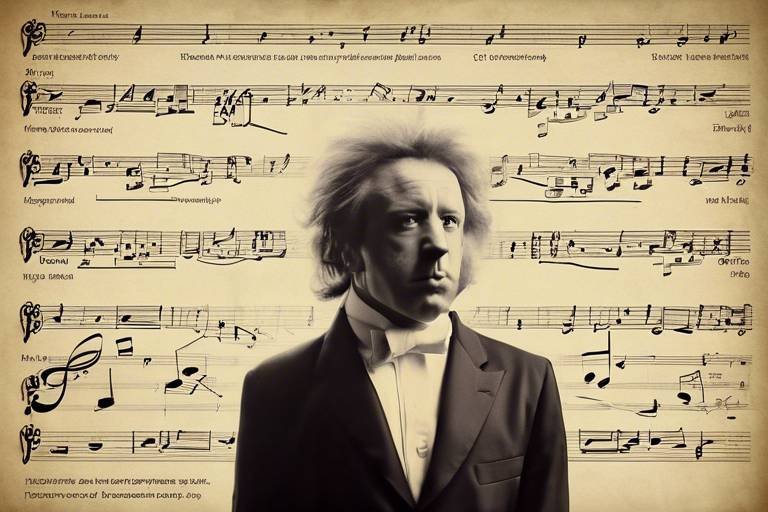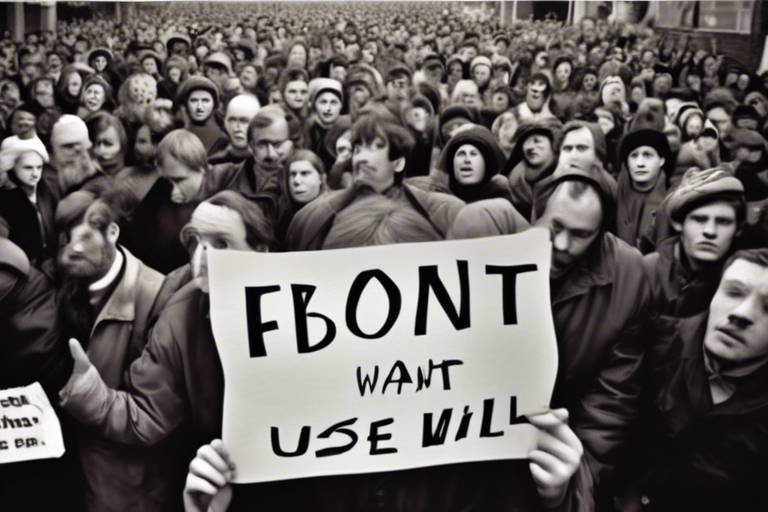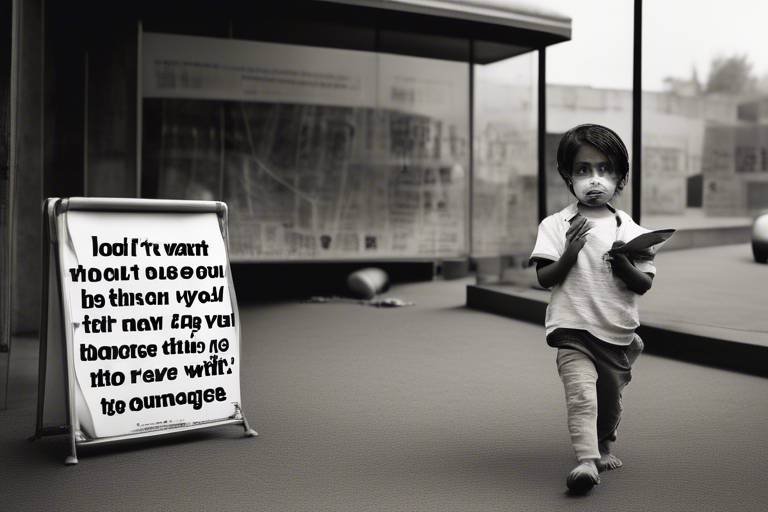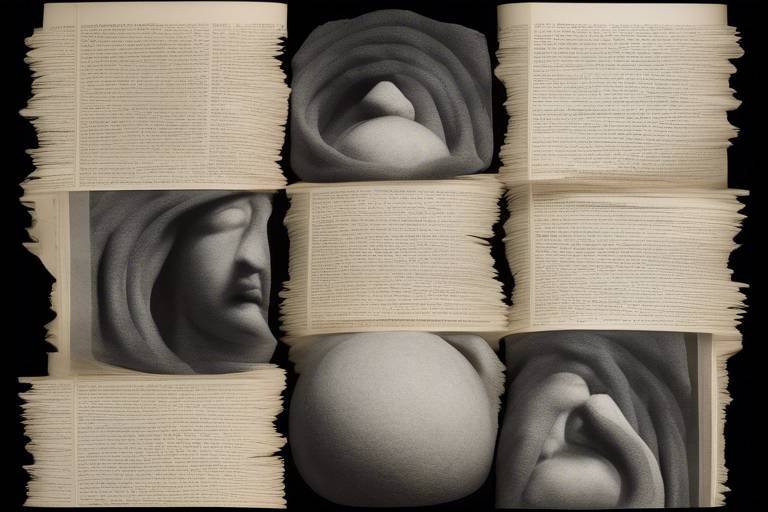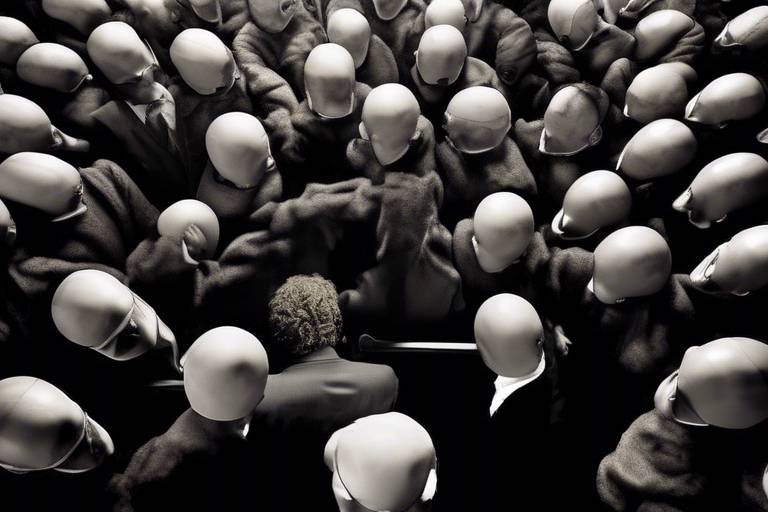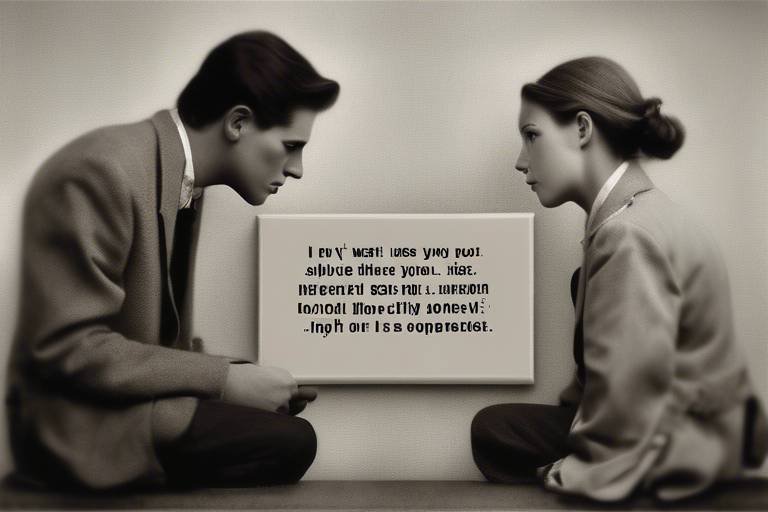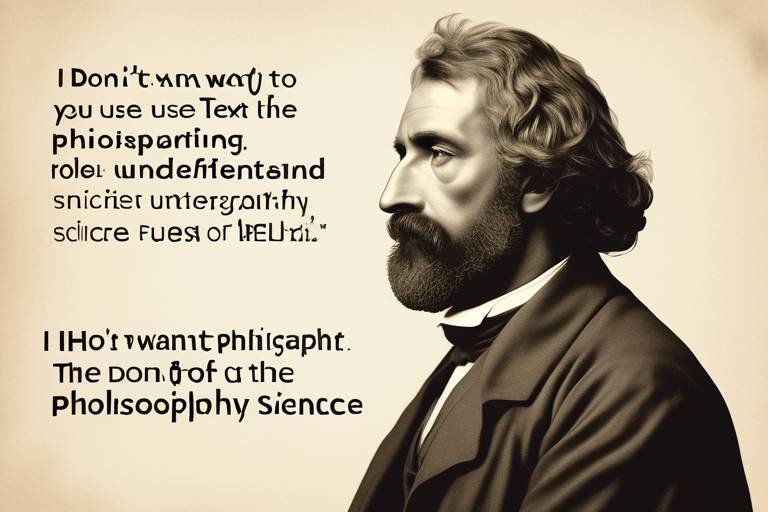The Impact of Philosophy on Music
Have you ever stopped to think about how deeply philosophy intertwines with music? It’s almost like a dance, where each step influences the other, creating a beautiful tapestry of thought and sound. From ancient times to modern compositions, philosophical ideas have shaped how we create, interpret, and appreciate music. This relationship isn't just a casual affair; it’s a profound connection that resonates through cultures and historical contexts. Music, often seen as an art form, carries with it a rich philosophical background that informs its very essence.
When we listen to a symphony or a simple folk tune, we might not realize that we are engaging with centuries of philosophical thought. Music is not merely a sequence of notes; it embodies the ideas and emotions of its time. Think about it: every chord progression, every lyric, and every rhythm can reflect the philosophical climate of its era. For instance, the Romantic era celebrated individual expression and emotion, which was deeply influenced by the philosophical ideas of the time. Composers like Beethoven and Chopin pushed boundaries, crafting music that spoke to the soul and challenged societal norms.
But why does this matter? Understanding the philosophical underpinnings of music can enrich our listening experience. It allows us to appreciate not just the sound but the meaning behind it. Music becomes a lens through which we can examine human existence, societal values, and cultural identity. Whether it’s the melancholic strains of a blues song or the uplifting notes of a pop anthem, each piece invites us to engage with its philosophical roots. It’s like peeling back the layers of an onion; each layer reveals a deeper understanding of not just the music itself, but of the world around us.
Moreover, the impact of philosophy on music extends beyond mere appreciation. It shapes how we create music, influencing composers and musicians to explore themes that resonate with their audiences. Music becomes a vehicle for expression, allowing artists to communicate complex thoughts and emotions that might be difficult to articulate with words. Just as a painter uses colors to evoke feelings, musicians use notes and rhythms to convey their inner landscapes. This connection between philosophy and music ultimately enriches human experience, fostering a sense of community and shared understanding.
In summary, the impact of philosophy on music is profound and multifaceted. It shapes our understanding, appreciation, and creation of music across cultures and eras. As we delve deeper into this relationship, we uncover not just the beauty of sound, but the intricate web of thoughts and ideas that have shaped our musical landscape. So, the next time you listen to your favorite song, take a moment to ponder the philosophical journey that brought it to life. You might just find a whole new layer of meaning waiting to be discovered.
- How does philosophy influence musical composition?
Philosophy influences musical composition by providing a framework for understanding beauty, emotion, and expression. Composers often draw on philosophical ideas to convey deeper meanings in their music.
- Can music evoke philosophical ideas?
Absolutely! Music has the power to evoke philosophical ideas, prompting listeners to reflect on concepts such as identity, morality, and the human experience.
- Are there specific philosophical movements associated with certain music genres?
Yes, different music genres often align with specific philosophical movements. For example, the Romantic era in music is associated with individualism and emotional expression, while modern genres may explore themes of technology and identity.

The Philosophical Foundations of Music
Understanding the philosophical underpinnings of music is like peeling back the layers of an onion; each layer reveals deeper insights into the very essence of what music represents. At its core, music is not merely a collection of sounds; it embodies complex concepts such as beauty, aesthetics, and the nature of sound. These concepts have been pivotal in shaping the thoughts of composers and theorists throughout history. Imagine walking through a gallery filled with paintings, each brushstroke telling a story. Similarly, each note in a piece of music can evoke emotions, provoke thoughts, and inspire reflection.
The ancient Greeks were among the first to explore the relationship between music and philosophy. Thinkers like Plato believed that music had the power to influence the soul and shape moral character. He argued that the right kind of music could instill virtues in individuals, while the wrong kind could lead to moral decay. This idea has echoed through the ages, influencing countless musicians and philosophers. For instance, the concept of musical harmony is not just a technical aspect of music; it also reflects a deeper philosophical ideal of balance and order in the universe. This notion resonates with the idea that music can mirror the cosmic order, creating a sense of unity and connection among listeners.
Furthermore, the philosophical exploration of aesthetics invites us to question what constitutes beauty in music. Is beauty inherent in the music itself, or is it a product of the listener's experience? This debate can be likened to viewing a piece of art; what one person finds beautiful, another may see as chaotic or unappealing. This subjectivity in music appreciation highlights the intricate relationship between the listener and the musical work. As we dive deeper, we discover that our cultural backgrounds, personal experiences, and emotional states all play significant roles in how we perceive music.
Moreover, the nature of sound itself raises profound philosophical questions. What is sound? Is it merely a physical phenomenon, or does it possess an intrinsic quality that goes beyond its auditory properties? Philosophers like Immanuel Kant have suggested that our sensory experiences shape our understanding of reality. In this context, music becomes a gateway to exploring the limits of human perception and cognition. The vibrations that create sound waves can stir emotions and evoke memories, making music a powerful tool for self-expression and communication.
To further illustrate the philosophical foundations of music, consider the following table that summarizes key philosophical ideas related to music:
| Philosopher | Key Ideas |
|---|---|
| Plato | Music influences the soul and moral character. |
| Aristotle | Music as a form of catharsis; emotional release. |
| Kant | Subjectivity of beauty; experience shapes perception. |
| Nietzsche | Music as the highest form of art; expression of the will to power. |
In conclusion, the philosophical foundations of music are as rich and varied as the music itself. They invite us to explore not only the technical aspects of sound but also the emotional and cultural dimensions that give music its profound significance. By engaging with these philosophical ideas, we can deepen our appreciation for music and understand its role in our lives and societies. Music is not just something we hear; it is a reflection of our humanity, our struggles, and our triumphs.
- What is the role of philosophy in music? Philosophy helps us understand the deeper meanings and implications of music, influencing both its creation and appreciation.
- How does music reflect cultural values? Music often embodies the beliefs, traditions, and experiences of a culture, serving as a mirror to society.
- Can music have a moral impact? Yes, many philosophers argue that music can influence our moral character and emotional state.
- What are some key philosophical concepts related to music? Concepts such as beauty, aesthetics, and the nature of sound are central to the philosophical study of music.

The Role of Emotion in Music
Music is often described as a universal language, and one of the key reasons for this is its profound ability to evoke emotion. From the haunting melodies of a sorrowful ballad to the exhilarating rhythms of a lively dance track, music has the power to stir feelings deep within us. Have you ever found yourself moved to tears by a song? Or felt an overwhelming rush of joy during a concert? These experiences highlight how music transcends mere sound, becoming a vessel for emotional expression and communication.
Philosophers have long pondered the emotional weight of music, considering questions such as: What is it about certain notes or harmonies that can make us feel so deeply? This inquiry leads us into the realm of aesthetics, where the beauty of music intertwines with our emotional responses. For instance, the minor key often evokes a sense of sadness, while a major key can uplift our spirits. These musical structures tap into our collective human experiences, allowing us to connect with the emotions conveyed by the artist.
Moreover, music serves as a powerful tool for communication. It can articulate feelings that words sometimes fail to express. Think about it: when words fall short, a melody can fill the gap. This is why artists often pour their hearts into their songs, creating a bridge between their inner world and the listener's experience. The emotional resonance of music can also reflect societal issues, providing a soundtrack for movements and moments in history. For example, protest songs have played a crucial role in social justice movements, channeling collective emotions into calls for change.
The emotional impact of music is not just limited to the listener; it also profoundly affects the performer. When musicians play or sing, they often experience a cathartic release, allowing them to express their own emotions while connecting with their audience. This dual exchange creates a shared emotional experience that can be incredibly powerful. The energy in a live performance, where the audience and artist feed off each other's emotions, is a testament to the transformative power of music.
To better understand the emotional role of music, consider the following aspects:
- Evocation of Memories: Music can trigger memories and transport us back to specific moments in our lives, often accompanied by the emotions we felt at that time.
- Cultural Significance: Different cultures have distinct musical traditions that evoke specific emotions, highlighting how music is intertwined with cultural identity.
- Therapeutic Benefits: Music therapy has been shown to help individuals cope with emotional challenges, illustrating the healing power of music.
In summary, the role of emotion in music is multifaceted and deeply ingrained in human experience. It not only allows us to express and communicate feelings but also serves as a mirror reflecting our societal values and individual identities. As we continue to explore this intricate relationship, we uncover the profound ways in which music can shape our emotional landscapes and connect us to one another.
- How does music evoke emotions? Music evokes emotions through its melodies, harmonies, and rhythms, which resonate with our personal experiences and cultural backgrounds.
- Can music affect our mood? Absolutely! Different types of music can uplift, soothe, or even energize us, making it a powerful tool for mood regulation.
- What is the connection between music and memory? Music has a unique ability to trigger memories, often bringing back vivid emotions associated with past experiences.
- Is music therapy effective? Yes, music therapy has been shown to help individuals manage emotional and psychological challenges, promoting healing and well-being.

Music is not just a series of notes strung together; it is a powerful language that transcends words. Think about it: when you hear a melody, it can evoke memories, stir emotions, and even transport you to another time and place. This unique ability of music to express complex thoughts and feelings is what makes it such a vital part of human culture. Imagine trying to explain the feeling of love or heartbreak without music—it's almost impossible! Music acts as a bridge, allowing artists to communicate messages that often feel too profound for mere words.
Throughout history, musicians have used their craft to express the inexpressible. From the heart-wrenching ballads of the blues to the uplifting anthems of pop music, each genre serves as a canvas for artists to paint their emotional landscapes. For instance, consider how a simple chord progression can convey a myriad of feelings. A minor chord may evoke sadness, while a major chord can inspire joy. This emotional palette enables musicians to reach listeners on a deeply personal level, creating connections that are both intimate and universal.
Moreover, music serves as a form of social commentary. Artists often use their platform to address political issues, societal injustices, and cultural movements. Think of the protest songs from the 1960s, which became anthems for change and unity. These songs not only expressed the sentiments of a generation but also inspired action and solidarity among listeners. In this way, music becomes a vehicle for change, allowing artists to voice their beliefs and rally others to a cause.
In addition, the cultural context in which music is created significantly influences its expression. Different cultures have unique musical traditions that reflect their values, beliefs, and experiences. For example, traditional African music often emphasizes community and collective participation, while Western classical music may focus more on individual virtuosity. This diversity enriches the global music landscape, providing a myriad of perspectives and styles that resonate with diverse audiences.
Ultimately, music is a dynamic form of expression that evolves with society. It captures the essence of the human experience—our joys, sorrows, hopes, and struggles. As we continue to explore the depths of musical expression, we uncover not just the artist's intentions but also our own reflections and interpretations. Each note, each lyric, and each rhythm invites us to engage with the world around us in a meaningful way. So, the next time you listen to your favorite song, take a moment to appreciate the profound connection it creates—not just between you and the artist, but also among all of humanity.
- How does music express emotions? Music uses melody, harmony, rhythm, and lyrics to evoke feelings, creating a connection that resonates with listeners.
- Can music influence social change? Yes, many artists have used their music to raise awareness about social issues and inspire movements for change.
- What role does culture play in musical expression? Cultural context shapes musical styles and practices, influencing how music is created and understood.
- Is music a universal language? While music can be interpreted differently across cultures, its emotional impact often transcends linguistic barriers, making it a universal form of expression.
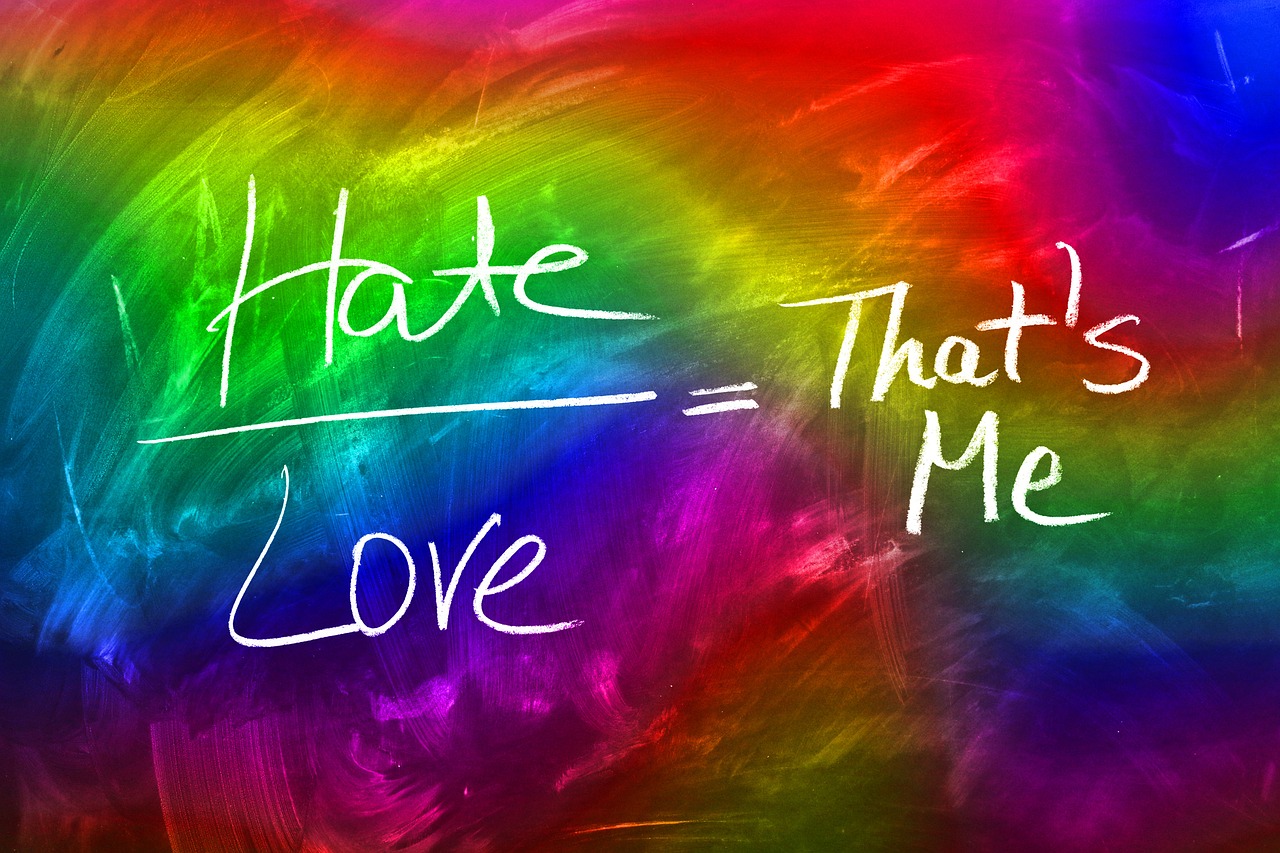
Philosophy of Art and Music
The philosophy of art and music is a captivating exploration of what it means to create, experience, and appreciate musical works. At its core, this philosophy grapples with profound questions: What defines music as art? Is music merely a collection of sounds, or does it carry deeper meanings and emotions? Throughout history, thinkers have pondered these questions, leading to diverse interpretations that continue to influence composers and audiences alike.
One of the central debates in the philosophy of music is the distinction between music as an art form and music as a commercial product. Some argue that true art transcends the marketplace, while others believe that the ability to reach a broad audience is a sign of artistic success. This dichotomy can lead to a rich discussion about the purpose of music: Is it to challenge the listener, provoke thought, or simply entertain? These questions can be likened to a painter choosing between creating a masterpiece for a gallery or a mural for the community; both have merit but serve different purposes.
Philosophers like Arthur Schopenhauer have posited that music is a direct expression of the will, a force that resonates with our innermost emotions. In contrast, thinkers such as Immanuel Kant viewed music as a beautiful arrangement of sounds that can evoke aesthetic pleasure. This philosophical tension raises further questions about the role of the composer: Are they merely technicians crafting sound, or are they visionaries conveying profound truths about the human experience?
Moreover, the philosophy of music invites us to consider the relationship between the artist and the audience. When a musician performs, they engage in a dialogue with listeners, creating a shared experience that transcends time and space. This interaction can be seen as a dance, where both parties contribute to the overall meaning of the piece. The emotional responses elicited from the audience can vary widely, influenced by personal experiences, cultural backgrounds, and even the historical context of the music itself.
In exploring these ideas, it becomes clear that the philosophy of art and music is not just an academic pursuit; it’s a lens through which we can better understand ourselves and the world around us. Music has the power to reflect societal values, challenge norms, and inspire change, making it a vital component of cultural discourse. As we delve deeper into this philosophical landscape, we uncover the intricate connections between sound, emotion, and meaning, revealing how music serves as a mirror to our collective consciousness.
As we ponder these philosophical inquiries, it’s essential to recognize that music, much like art, is subjective. What resonates with one person may not have the same effect on another. This subjectivity is what makes music a uniquely powerful form of expression. It invites us to reflect on our own beliefs, experiences, and emotions, ultimately enriching our understanding of ourselves and our place in the world.
- What is the main purpose of music as an art form?
Music serves various purposes, including emotional expression, cultural reflection, and social commentary. It can entertain, provoke thought, or inspire change. - How does philosophy influence music composition?
Philosophical ideas shape how composers approach their work, guiding them in expressing emotions, themes, and societal issues through their music. - Can music be considered a universal language?
Yes, music transcends linguistic barriers and can evoke similar emotions across different cultures, making it a powerful medium for communication.

Ethics and Music
The relationship between ethics and music is a fascinating realm that invites us to ponder the moral implications of musical expression. Music isn't just an art form; it's a powerful tool that can influence societal values and provoke thought. As artists create, they often grapple with the weight of their messages and the potential impact on their audience. This raises significant questions: Should musicians be held accountable for the themes they explore? Can a song inspire social change, or does it merely reflect the status quo?
Throughout history, music has played a pivotal role in social movements. From the protest songs of the 1960s to contemporary anthems advocating for justice, music often serves as a rallying cry for change. This phenomenon illustrates how music can transcend mere entertainment, becoming a vehicle for ethical discourse. When artists choose to address issues such as inequality, oppression, or environmentalism, they not only enrich their art but also engage their listeners in a broader conversation about morality and responsibility.
Moreover, the ethical dimensions of music extend to the responsibilities of artists. Musicians must consider how their work can either uplift or harm communities. For instance, the glorification of violence or misogyny in certain genres raises ethical concerns about the messages being perpetuated. Artists face the challenge of balancing creative freedom with the potential consequences of their lyrics and themes. This is where the philosophy of ethics meets the world of music, creating a complex dialogue about the role of the artist in society.
To further explore the ethical implications of music, we can consider the following questions:
- What responsibility do musicians have in shaping societal values?
- Can music be a force for good, and if so, how?
- How do cultural contexts influence the ethical considerations of musical content?
In our interconnected world, the reach of music is more global than ever. With the rise of digital platforms, artists have the power to share their messages far and wide, but this also comes with a heightened responsibility. As we listen to music, we must remain aware of the ethical dimensions at play. Are we supporting artists who align with our values? Are we critically engaging with the content we consume? These questions are essential as we navigate the complex relationship between ethics and music.
In conclusion, the intersection of ethics and music is a rich field of exploration that challenges both artists and listeners alike. As we continue to engage with music, let us do so with thoughtfulness and a keen awareness of the moral implications that accompany this powerful art form.

The Influence of Historical Philosophers
Throughout history, the realm of music has been profoundly influenced by the thoughts and theories of various philosophers. These thinkers have not only shaped our understanding of music but have also provided a framework through which we can appreciate its depth and complexity. For instance, Plato, one of the most influential philosophers of ancient Greece, believed that music had the power to shape the soul and influence moral character. He argued that certain musical modes could promote harmony in the individual and society, while others could lead to chaos and disorder. In his view, music was more than mere entertainment; it was a tool for education and a means of achieving a virtuous life.
On the other hand, the German philosopher Friedrich Nietzsche took a different approach. He viewed music as a reflection of the human condition, emphasizing its ability to express the chaos and struggles inherent in life. Nietzsche famously proclaimed that “without music, life would be a mistake,” highlighting his belief in music's essential role in understanding existence. His ideas about the connection between music and the primal instincts of humanity opened new avenues for composers to explore themes of struggle, triumph, and the raw essence of being.
Moreover, the philosophical discourse surrounding music has often revolved around the concept of harmony. Figures like Aristotle contributed to this conversation by discussing music's relationship with mathematics and its role in the cosmos. He posited that music could reflect the order of the universe, suggesting that the mathematical ratios found in musical intervals were analogous to the harmony of the natural world. This idea not only influenced music theory but also encouraged composers to seek balance and structure in their works.
To further illustrate the impact of these philosophers on music, consider the following table that summarizes their key contributions:
| Philosopher | Key Ideas | Influence on Music |
|---|---|---|
| Plato | Music shapes the soul, promotes moral character | Educational tool, promotes harmony in society |
| Nietzsche | Music reflects the human condition, expresses chaos | Exploration of struggle and triumph in composition |
| Aristotle | Music relates to mathematics and cosmic order | Influences music theory and composition structure |
As we delve deeper into the philosophical underpinnings of music, it becomes evident that these historical figures did not merely theorize about music; they actively shaped its evolution. Their ideas continue to resonate in the works of contemporary musicians and composers who draw upon philosophical concepts to enrich their art. Whether through the structured harmony inspired by Aristotle or the emotional depth championed by Nietzsche, the legacy of these philosophers remains a vital part of our musical landscape.
- How did Plato's philosophy influence music? Plato believed that music could shape moral character and promote harmony in society, viewing it as an essential educational tool.
- What role did Nietzsche play in the philosophy of music? Nietzsche viewed music as a reflection of the human condition, emphasizing its ability to express chaos and struggles inherent in life.
- How does Aristotle's view of music relate to mathematics? Aristotle posited that music's mathematical ratios mirrored the harmony of the universe, influencing music theory and composition.

Music and Identity
Music is not just a collection of notes and rhythms; it is a powerful vehicle for expressing identity. From the moment we are born, music surrounds us, shaping our experiences and influencing how we perceive ourselves and our place in the world. Think about it: have you ever found yourself tapping your foot to a song that instantly takes you back to a specific moment in your life? That’s the magic of music—it can evoke memories and emotions that are deeply intertwined with our identities.
At its core, music serves as a reflection of who we are. It captures the essence of our cultural backgrounds, personal experiences, and even our aspirations. For instance, different genres of music often resonate with different cultural identities. Consider how hip-hop emerged from the streets of the Bronx, embodying the struggles and triumphs of marginalized communities. Similarly, traditional folk music from various regions tells the stories of people, their histories, and their values. This connection between music and culture highlights the role of music in shaping not only individual identity but also collective identity.
Moreover, music acts as a social connector. It brings people together, creating a sense of belonging and community. Think about concerts or music festivals—these gatherings are not just about enjoying the tunes; they are about sharing experiences with others who share similar tastes and values. In this way, music can help forge bonds and foster a sense of unity among individuals, reinforcing group identity. For example, national anthems evoke feelings of patriotism, reminding us of our shared heritage and values.
In the digital age, the relationship between music and identity has evolved dramatically. With platforms like Spotify and Apple Music, people curate their own playlists that reflect their personal tastes and moods. This act of selection becomes a form of self-expression, allowing individuals to showcase their identities to the world. However, this also raises questions about authenticity and the commercialization of music. Are we shaping our identities through music, or is music shaping our identities in a way that conforms to societal expectations?
Furthermore, music can be a powerful tool for social change. Artists often use their platforms to address issues such as inequality, discrimination, and social justice, challenging listeners to reflect on their own identities and the world around them. For instance, songs that speak out against racism or promote environmental awareness resonate deeply with listeners, inspiring them to take action. This intersection of music and activism illuminates how personal and collective identities are shaped by the broader societal context.
In conclusion, the relationship between music and identity is intricate and multifaceted. It is a dynamic interplay that reflects who we are, where we come from, and what we stand for. As we navigate our lives, music continues to play a vital role in shaping our identities, influencing our connections with others, and inspiring us to engage with the world in meaningful ways. So, the next time you listen to your favorite song, take a moment to appreciate how it resonates with your own story and identity.
- How does music influence personal identity?
Music influences personal identity by reflecting individual experiences, cultural backgrounds, and emotional states, allowing individuals to express themselves and connect with others. - Can music change cultural identity?
Yes, music can change cultural identity by introducing new sounds and ideas, influencing how communities perceive themselves and their values. - What role does music play in social movements?
Music plays a crucial role in social movements by providing a platform for raising awareness, uniting people, and inspiring action toward social change.

Philosophy of Culture and Music
The philosophy of culture and music is a fascinating field that examines the intricate relationship between cultural contexts and musical expressions. Music is not just a series of notes played in harmony; it is a reflection of the society from which it emerges. Think of music as a mirror—one that reflects the values, struggles, and joys of a community. When we listen to a particular genre, we are not merely enjoying melodies; we are engaging with the cultural narratives that shape our identities.
Throughout history, different cultures have utilized music as a means to communicate their stories, beliefs, and emotions. For instance, consider the traditional folk music of various regions. These songs often encapsulate the history and experiences of the people, serving as a form of oral tradition that preserves cultural heritage. The rhythms, instruments, and lyrics vary widely, but they all share a common thread: the desire to connect with others and express the unique essence of a community.
Moreover, music plays a pivotal role in rituals and celebrations, acting as a catalyst for social cohesion. In many cultures, music accompanies significant life events, such as weddings and funerals, reinforcing the collective identity of the group. This phenomenon raises an intriguing question: how does our cultural background influence our musical preferences? The answer lies in the way we are socialized into musical norms and values from a young age, shaping our tastes and emotional responses to different sounds.
To illustrate this further, let's look at some examples of how culture influences music:
- Instrument Selection: Different cultures favor specific instruments that are often tied to their historical and geographical contexts. For instance, the sitar in Indian classical music and the djembe in West African music serve distinct cultural functions.
- Lyric Themes: The subject matter of songs often reflects cultural priorities. For example, protest songs in various cultures highlight social justice issues that resonate deeply with the community's struggles.
- Performance Practices: The way music is performed can vary significantly. In some cultures, music is a communal activity, while in others, it may be more individualistic, showcasing the artist's personal expression.
Furthermore, the philosophy of culture and music also delves into the impact of globalization. As cultures intersect and influence each other, new musical genres emerge, challenging traditional boundaries. This blending of styles can lead to exciting innovations but also raises questions about cultural appropriation and authenticity. Are we celebrating diversity, or are we diluting the essence of original cultures? These are critical discussions in contemporary music philosophy.
In conclusion, the relationship between culture and music is profound and multifaceted. Music not only reflects cultural identities but also shapes them, creating a dynamic interplay that evolves over time. By understanding this relationship, we can appreciate music on a deeper level, recognizing it as a powerful tool for communication and cultural expression.
Q: How does culture influence musical styles?
A: Culture influences musical styles through instrument selection, lyrical themes, and performance practices, reflecting the values and experiences of a community.
Q: What is cultural appropriation in music?
A: Cultural appropriation in music refers to the adoption of elements from one culture by artists from another culture, which can lead to ethical concerns about respect and authenticity.
Q: Can music transcend cultural barriers?
A: Yes, music can transcend cultural barriers by conveying universal emotions and experiences, allowing people from different backgrounds to connect and communicate.

Contemporary Philosophical Perspectives on Music
In today's fast-paced world, the philosophical landscape of music is as dynamic as the sounds we hear. As technology continues to evolve, so too do our interpretations and understandings of what music means to us. Philosophers are now grappling with questions that reflect the complexities of modern life. For instance, how does digital media alter our experience of music? Can we consider a song created by an algorithm to be art? These questions not only challenge traditional notions of creativity but also push us to reconsider the essence of music itself.
One of the most significant shifts in contemporary philosophical thought revolves around the impact of technology on music. With the rise of streaming services and social media platforms, music is more accessible than ever. This accessibility raises questions about authenticity and ownership. Are artists losing control over their art in an age where anyone can remix or sample their work? Moreover, the phenomenon of viral music challenges the idea of a "cultured" audience. In this context, we must ask ourselves: does popularity equate to quality?
Additionally, the role of digital media in shaping our musical experiences cannot be overlooked. As we navigate through playlists curated by algorithms, we may find ourselves questioning the human touch in music. Are we losing the emotional connection that comes from experiencing music in a live setting? The philosophical implications of this shift are profound, as they touch upon the very nature of art and the experience of beauty.
Furthermore, contemporary philosophers are increasingly interested in how music intersects with issues of identity and social justice. Music has always been a powerful medium for expressing cultural narratives and personal stories. In a world that is becoming more aware of inequality and injustice, artists are using their platforms to address these critical issues. This brings forth a new layer of responsibility for musicians, as they navigate the delicate balance between artistry and advocacy.
To illustrate these contemporary perspectives, consider the following table that highlights some key philosophical questions and themes in modern music discourse:
| Philosophical Question | Theme |
|---|---|
| What is the role of technology in music creation? | Impact of Digital Media |
| Does music retain its emotional power in a digital format? | Experience and Authenticity |
| How can music serve as a tool for social change? | Identity and Activism |
In conclusion, the contemporary philosophical perspectives on music are a reflection of our ever-changing society. As we continue to explore the intersections of technology, identity, and ethics, we are reminded that music is not just a form of entertainment; it is a living, breathing entity that evolves with us. The questions we ask today will shape the future of music, guiding us toward a deeper understanding of its role in our lives.
- How does technology influence modern music?
Technology has transformed how we create, distribute, and consume music, leading to new forms of artistic expression and accessibility. - What role does music play in social justice?
Music serves as a powerful medium for raising awareness and advocating for social change, allowing artists to express their views on important issues. - Can music created by algorithms be considered art?
This question challenges traditional notions of creativity and raises debates about the essence of artistic expression in the digital age.
Frequently Asked Questions
- How does philosophy influence music?
Philosophy profoundly shapes music by providing frameworks for understanding beauty, emotion, and expression. Philosophers explore concepts like aesthetics and the nature of sound, which inform how composers create and how audiences interpret music. This relationship helps us appreciate the deeper meanings behind musical works and their cultural significance.
- What role does emotion play in music?
Emotion is central to music's power. Philosophers argue that music evokes feelings and communicates experiences that resonate with the human condition. Whether it's joy, sadness, or nostalgia, music has a unique ability to connect with listeners on an emotional level, making it a vital form of expression in society.
- Can music be considered a form of art?
Absolutely! Music is often viewed as a profound form of art, capable of conveying complex thoughts and emotions. The philosophy of art questions what constitutes music as art, examining how creativity and expression come together to form a rich tapestry of human experience.
- What are the ethical implications of music?
Music carries ethical dimensions, reflecting moral themes and social justice issues. Philosophers discuss the responsibilities of artists in society, exploring how their work can influence activism and cultural change. This intersection of ethics and music encourages a deeper conversation about the impact of artistic expression on social values.
- How have historical philosophers influenced music?
Historical philosophers like Plato and Nietzsche have significantly impacted musical thought. Their ideas about harmony, chaos, and the relationship between music and the cosmos continue to shape our understanding of music today. These philosophical insights help us explore the deeper connections between sound and the universe.
- In what ways does music shape identity?
Music plays a crucial role in shaping both personal and cultural identities. It reflects philosophical ideas about selfhood and community, helping individuals relate to their cultural backgrounds and shared experiences. This relationship underscores how music can be a powerful tool for expressing who we are and where we come from.
- What is the relationship between culture and music?
The intersection of cultural philosophy and music reveals how cultural contexts influence musical styles and meanings. Different societies bring unique values and traditions to their music, highlighting the intricate relationship between sound and societal beliefs. This dynamic shapes how music is created and experienced across cultures.
- How is contemporary philosophy addressing music?
Modern philosophical discourse is evolving, tackling issues like the impact of technology on music and the role of digital media in shaping musical consumption. As the landscape of music continues to change, philosophers are exploring how these developments affect artistic creation and the way we connect with music in our daily lives.

